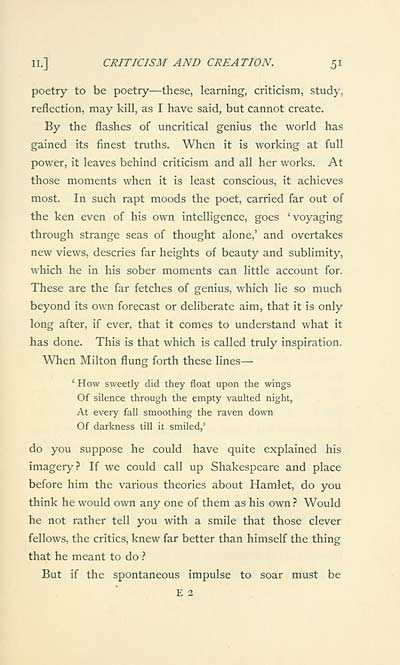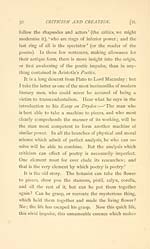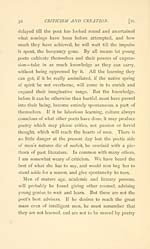Download files
Complete book:
Individual page:
Thumbnail gallery: Grid view | List view

II.] CRITICISM AND CREATION. 51
poetry to be poetry — these, learning, criticism, study,
reflection, may kill, as I have said, but cannot create.
By the flashes of uncritical genius the world has
gained its finest truths. When it is working at full
power, it leaves behind criticism and all her works. At
those moments when it is least conscious, it achieves
most. In such rapt moods the poet, carried far out of
the ken even of his own intelligence, goes 'voyaging
through strange seas of thought alone,' and overtakes
new views, descries far heights of beauty and sublimity,
which he in his sober moments can little account for.
These are the far fetches of genius, which lie so much
beyond its own forecast or deliberate aim, that it is only
long after, if ever, that it comes to understand what it
has done. This is that which is called truly inspiration.
When Milton flung forth these lines —
•' How sweetly did they float upon the wings
Of silence through the empty vaulted night,
At every fall smoothing the raven down
Of darkness till it smiled,'
do you suppose he could have quite explained his
imagery? If we could call up Shakespeare and place
before him the various theories about Hamlet, do you
think he would own any one of them as his own ? Would
he not rather tell you with a smile that those clever
fellows, the critics, knew far better than himself the thing
that he meant to do .-*
But if the spontaneous impulse to soar must be
E 2
poetry to be poetry — these, learning, criticism, study,
reflection, may kill, as I have said, but cannot create.
By the flashes of uncritical genius the world has
gained its finest truths. When it is working at full
power, it leaves behind criticism and all her works. At
those moments when it is least conscious, it achieves
most. In such rapt moods the poet, carried far out of
the ken even of his own intelligence, goes 'voyaging
through strange seas of thought alone,' and overtakes
new views, descries far heights of beauty and sublimity,
which he in his sober moments can little account for.
These are the far fetches of genius, which lie so much
beyond its own forecast or deliberate aim, that it is only
long after, if ever, that it comes to understand what it
has done. This is that which is called truly inspiration.
When Milton flung forth these lines —
•' How sweetly did they float upon the wings
Of silence through the empty vaulted night,
At every fall smoothing the raven down
Of darkness till it smiled,'
do you suppose he could have quite explained his
imagery? If we could call up Shakespeare and place
before him the various theories about Hamlet, do you
think he would own any one of them as his own ? Would
he not rather tell you with a smile that those clever
fellows, the critics, knew far better than himself the thing
that he meant to do .-*
But if the spontaneous impulse to soar must be
E 2
Set display mode to: Large image | Transcription
Images and transcriptions on this page, including medium image downloads, may be used under the Creative Commons Attribution 4.0 International Licence unless otherwise stated. ![]()
| Early Gaelic Book Collections > Ossian Collection > Aspects of poetry > (67) |
|---|
| Permanent URL | https://digital.nls.uk/78386076 |
|---|
| Description | Selected books from the Ossian Collection of 327 volumes, originally assembled by J. Norman Methven of Perth. Different editions and translations of James MacPherson's epic poem 'Ossian', some with a map of the 'Kingdom of Connor'. Also secondary material relating to Ossianic poetry and the Ossian controversy. |
|---|
| Description | Selected items from five 'Special and Named Printed Collections'. Includes books in Gaelic and other Celtic languages, works about the Gaels, their languages, literature, culture and history. |
|---|

